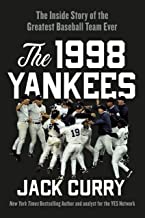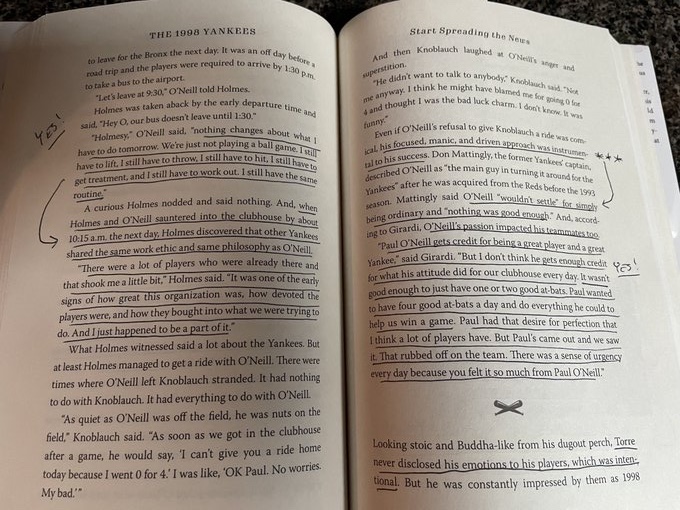 Whether you work in ministry, athletics, business, education, or the non-profit world, you have to overcome challenges each day to become successful. But what happens when the top obstacle you encounter on a daily basis is the person right beside you?
Whether you work in ministry, athletics, business, education, or the non-profit world, you have to overcome challenges each day to become successful. But what happens when the top obstacle you encounter on a daily basis is the person right beside you?
Few things are as challenging as going to work with people you can not trust, people who don’t have your back, carry their weight, or are always putting their personal interests ahead of the collective. These are simply bad teammates.
I just finished Jack Curry’s excellent book The 1998 Yankees: The Inside Story of the Greatest Baseball Team Ever. When you read about this legendary team you will find that the 1998 Yankees were not defined by their 125 wins or World Series championship. What defined this team was their chemistry and lack of dysfunction. As a team, they were unified and had a singular focus on winning every single inning, every single game, and ultimately the World Series.
One of the players who exemplified this approach was right fielder Paul O’Neill. In pages 147-149 shown above, we learn the following 11 lessons on being a great teammates from this Yankee legend:
Great Teammates Take Ownership Of Their Personal Performance
Poor teammates continually make excuses for their personal performance. In the worst cases, they blame others for their subpar results. Not Paul O’Neill.
When O’Neill made an out, he refused to acknowledge the pitcher retired him. They were not talented enough to get him out. O’Neill always believed he made the out and there was something else he could have done.
Great Teammates Invest In The Next Generation
O’Neill carpooled to games with rookie pitcher Darren Holmes. Each trip was a learning experience for the young athlete. O’Neill provided a wonderful example of what it meant to be not only a professional baseball player, but more specifically a New York Yankee.
Great Teammates Are The Hardest Workers
One thing Holmes learned from O’Neill was the value of hard work. One story from the book which stuck out to me was when the Yankees had an off-day. The team was scheduled to leave the stadium at 1:30 PM that day to travel to the following day’s game.
O’Neill told Holmes they would be arriving at the stadium at 10:15 AM. A confused Holmes wondered why they should arrive over three hours early. O’Neill said there was a workout he had to get in. In fact, Holmes discovered they were joined by a number of Yankee teammates.
Great Teammates Have A Successful Routine They Religiously Follow
They rely on systems, not silver bullets. Following up on the point above, O’Neill said, “Holmsey, nothing changes about what I have to do tomorrow. We’re just not playing a ball game. I still have to lift, I still have to throw, I still have to hit. I still have to get treatment, and I still have to work out. I still have the same routine.”
Great Teammates Have Great Focus
They are not easily distracted. Not only was O’Neill focused, Curry wrote, “his focused, manic, and driven approach was instrumental to his success.” Your focus will be instrumental to your success as well.
To go deeper on the New York Yankees and having great focus, read The Glue No One Talks About That Truly Creates Unity And Holds Teams Together.
Great Teammates Have Great Expectations
We all know people who are tougher on themselves than anyone else is. O’Neill was such a player. Nothing was ever good enough for O’Neill. He simply would not settle for being ordinary. After all, ordinary is overrated.
Great Teammates Have Great Attitudes
Teammate Joe Giradi said, “Paul O’Neill gets credit for being a great player and great Yankee. But I don’t think he gets enough credit for what his attitude did for our clubhouse every day.” As a teammate, your attitude will determine your altitude.
Great Teammates Don’t Waste Opportunity
There is a difference between sensing opportunity and seizing it. Giradi added, “It wasn’t good enough to just have one or two good at-bats. Paul wanted to have four good at-bats a day and do everything he could to help us win a game.”
Great teammates are stewards of the organization’s success.
Great Teammates Are The Embodiment Of The Organization’s Mission And Vision
They are a picture of the desired destination in which others should wish to arrive. They set the standard for others. In fact, they are the standard. Giradi continued, “Paul had that desire for perfection that I think a lot of players have. But Paul’s came out and we saw it. That rubbed off on the team.”
Great Teammates Have A Sense Of Urgency
They understand the work they are involved in matters. This is another reason they do not want to waste opportunity. What they are collectively doing is too important.
Giradi concluded, “There was a sense of urgency every day because you felt it so much from Paul O’Neill.”
Great Teammates Have Great Production
We all know people who work hard and have great attitudes but still have substandard performance. In my new book Mighty: 7 Skills You Need to Move from Pandemic to Progress I discuss the importance of production. Production validates your leadership. It confirms you are someone worth following.
In the 1998 baseball season, Paul O’Neill accomplished the following:
- .317 batting average
- 40 doubles
- 95 runs
- 12th in Most Valuable Player voting
- All-Star game participant
- In 13 post-season games in 1998, O’Neill had 15 hits and scored 10 runs.
This is someone whose performance is certainly worth following.
Conclusion
Being a great teammate does not happen by accident. It requires intentionality. If you want to be a better teammate or help others in this area, follow Paul O’Neill’s example.
O’Neill was not the only great teammate on the 1998 New York Yankees. To read several other profiles of what great teammates look like purchase Curry’s book by clicking HERE or on the image above.
My latest eBook is available for download. The Top 65 Leadership Quotes Of 2022 Part 1 is a resource every leader should have. Great quotes bring clarity and put into words who we intuitively feel as leaders. They give us wisdom and insights which advance the mission and vision of our organizations. This eBook includes thoughts and insights from leaders like Warren Buffett, Nick Saban, James Clear, Dawn Staley, Jurgen Klopp, Jerry Seinfeld, and even Ted Lasso. This resource will take you about 10 minutes to read but a lifetime to apply. You will want to stop and ponder the implications of each quote. Click HERE or on the image provided for immediate download!


